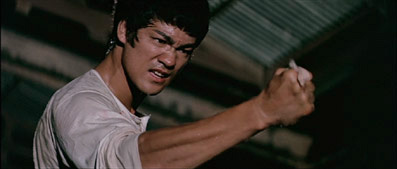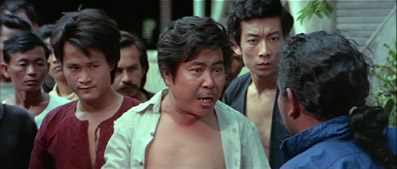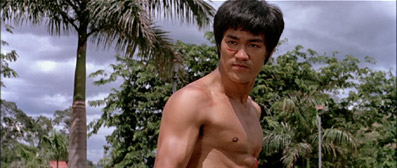|
It
has to be the best tease in martial arts movie history.
You have on your hands a new action star whose fighting
skills are soon to become the stuff of legend and what do you do? You
set up a plot that repeatedly puts him in situations where
the audience expects him to fight and then incorporate
a plot point that forbids him from doing so. And you keep it
that way for the first 44 minutes of a 96 minute film. Imagine
what that must have been like for those coming to the film
as their first experience of Bruce Lee back in 1971. I cannot
speak from experience because I, like many in the UK, arrived
at The Big Boss in retrospect, having discovered
Lee through the Hollywood backed Enter the Dragon.
But the tease still worked a treat. Enter the Dragon,
like almost every Hollywood actioner since, made sure to
give you a taste of things to come in the opening few minutes,
a hook designed to stop the terminally impatient from walking
out during the few minutes of activity-free plot-building
that followed. By the time I got to The Big Boss
I knew all too well what Lee could do and every time
characters exchanged even hard looks I was sinking in my
seat, read to revel in what was about to be unleashed. Except...
As new boy in town, Chao-an Cheng, Lee looked on, started
to move, but every time he showed signs of joining the battle he'd
fondle the necklace his mother gave him and remember the
promise he made to her not to fight. How long, I pondered seriously, could they keep this up?

Looking
back, you can't help wondering if the makers of The
Big Boss really appreciated just what they had
on their hands. Given Lee's extraordinary martial arts skills,
it's surprising how little fighting he actually does. There's
nothing for the first half of the film, and once his medallion
– and with it the vow to his mother – is broken, the pasting
he administers is over in seconds. We're 75 minutes
into the story before he really gets to let rip. Added to
that, there are whole chunks of the story in which he either
does not feature or is almost a secondary character – for
the first half-hour you could almost be forgiven for thinking
that Chao-an's friend Chien Hsiu (played by James Tien)
was the lead character. Until he gets killed, that is. There
are other fights, sure, but none of the other cast members,
decent fighters though they may be, can hold a candle to
Lee.
The
plot follows martial arts cinema tradition by quickly establishing
the moral gulf between the good guys and the bad, pitting the good-natured
employees of the ice factory at which Chao-an finds work against
a corrupt management and owner, who are using the factory
as a cover to smuggle drugs and killing anyone who gets
wind of their dealings. When two more workers disappear
after finding a package in the ice, their comrades threaten
to strike. The protest is broken up by hired goons, and
it's in this scuffle that Chao-an's medallion is broken
and from that point on all bets are off. Yet instead of
punishing Chao-an, the boss makes him foreman. The workers
are overjoyed and in their triumph completely forget about
their missing co-workers. Hoping to get information on them
from the Big Boss of the title, Chao-an finds himself increasingly
seduced by the high life and starts to lose touch with what
is happening to his friends.
All
of which is actually rather interesting, offering a
socialist revolutionary reading in which honest working men are pitted
against morally bankrupt and evil capitalists who put profit
over human life and revel in the luxuries of their ill-gotten
gains. It even offers a comment on the dangers of being
seduced by materialist trappings, as well as providing a
link to kung-fu as a method of self-defence employed by
those near the bottom of the social ladder, a fighting form
for the unarmed peasant rather than the protected social
elite.

But The Big Boss has earned its place in
the martial arts cinema hall of fame not as a social commentary,
but the film that really launched the career of the late
and great Bruce Lee, who to this day remains the genre's
most rightly revered performer. His fight time may be limited,
but from the moment he walks on screen he radiates the sort
of star quality that seems to come naturally only to the
blessed few, and when he does get to fight he electrifies
the screen. You'd
be hard pushed to make a case for The Big Boss
as Lee's best film, but it remains an important, enjoyable
and intermittently thrilling career launcher for the genre's
most radiant and durable star.
Fans
of the film will no doubt already own the previous Hong
Kong Legends release, and the first thing they will want
to know is if this Platinum edition, with its claims of
a "new, high-definition transfer," improves on
what was already a pretty decent print. The simple answer
is yes. This is a largely excellent transfer, the sharpness,
contrast and colour as good as that on many new Hollywood
releases. As with the previous version, there is some occasional
quality variation, but the standard only really drops in
a couple of shots in the gambling scene, where there is
light leakage onto the darker areas. The framing is 2.35:1
and the picture is anamorphically enhanced.
The
original Cantonese mono and a Cantonese stereo track are
offered, but there is frankly not much to choose between
them. No 5.1 remix has been attempted, and thankfully there
has been no attempt to just bang the soundtrack through
an AC3 encoder and call it 5.1, which usually results in
randomly placed sound effects. Those wishing to recapture
the spirit of that first UK screening can tune into the
English dub, with its inappropriate voices and completely
different music score.
Audio
Commentary
As
genre fans will by now know, the venerable Bey Logan has
left Hong Kong Legends for lands afar and probably more
money, and rather than repackage his excellent commentary
from the previous release, HKL have commissioned a new one
for this release by Andrew Staton and Will Johnson. There's
no doubting that they know their stuff, but their delivery
is sometimes a little dreary, occasionally sounding like
two guys watching TV after a crate of beers and a night
without sleep. Interestingly, Bey Logan gets a mention,
described as "ubiquitous" in a tone that suggests
the pair are perhaps not his biggest fans, but re-visiting
Logan's commentary from the previous release confirms how
much livelier and more enjoyable it is, and most of the
information supplied by Staton and Johnson was previously
covered by Logan and a lot more besides. One more thing – a clearly recorded commentary is one thing, but I, for
one, could have done without all of the amplified gulps,
inhalations and mouth noises that fill the space between
the words.

The
rest of the extra features are on disc 2 and are divided
into three sections.
Promotional Gallery
The
UK Platinum Trailer (1:25) is
the usual HKL video release stuff, and is joined by the
UK Promotional Trailer (1:28),
which is narrated by one of the Trailer Voice Man clan.
The
Original Theatrical Trailer (3:37)
is more specifically the original Hong Kong trailer. Some
entertainment value can be found in the shaky English translations,
which inform us that "Tony Liu gives an impassive performance"
and "Han Yin-Chen plays rotten and sinful," but
its main value is the the inclusion of shots from the much-discussed
but still unavailable deleted scenes. I'd bet real money
that this trailer has been fiddled with by the people at
HKL – several of the shots that do not contain any text
appear to have been replaced by identical ones from the
new transfer, resulting in some shot-to-shot quality jumps.
There's
not much to say about the Hong Kong Promotional
Trailer (2:18), and although the Rare
Uncut 8mm UK Trailer (3:56) may indeed be
rare, it is essentially a UK release version of the Hong
Kong trailer detailed above, but with the dialogue (there's
not much) in dubbed English rather than Cantonese.
The
Original 35mm UK Title Sequence
(1:29) is as charmingly cheap as the one on the actual print,
and the Textless 35mm Title Sequence
(2:15) is just what it says, but in widescreen rather than
scope.
Original
Lobby Cards (4:32) features a number of lobby
cards in sparkling condition, which the camera drifts over
and zooms slowly in and out of.
The
Story Continued
Paul Heller: Breaking the West (15:46)
is an interview with the Warner Bros. executive in the 1970s
who co-produced Enter the Dragon with Fred
Weintraub and co-developed the film script that would later
become the TV series Kung Fu. He talks
about the development of Kung Fu (which
was originally supposed to star Lee, but you knew that)
and working with Lee on Enter the Dragon,
but whoever put this together repeatedly employs that terrible
two-screen nonsense that HKL have become too bloody fond
of recently, which is REALLY distracting and visually detrimental
to an otherwise interesting interview.
Fred
Weintraub: A Rising Star (15:14) gives us
a second view of the same events and is similarly interesting
and is also cursed by the 2-screen wank every time the editor
wants to hide an edit in the interview.
The
trilogy is completed with Tom Kuhn: What Might
Have Been (10:51), an interview with Weintraub's
partner and the man who was president of TV at Warner Bros.
in the early 1970s and responsible for developing Kung
Fu as a series. Not wanting to break with tradition,
this suffers the same visual irritation as the other two
interviews in this section. Once again, it's very worthwhile
stuff – Kuhn first meeting with Lee is particularly memorable – just tiresomely presented.
Dragon
Uncovered
The
History of The Big Boss: A Photographic Retrospective
(14:33) is just what that title says it is, the story of
how The Big Boss came about, narrated by
HKL's own personal Trailer Voice Man over a series of still
photographs, which sometimes are completely unrelated to
what he is telling us about. For newcomers to the film and
Lee's career, this should prove a useful if uninspired introduction.
Deleted
Scenes Examined: The Story of the Elusive original Uncut
Print (9:52) is a very slowly scrolling textual
essay on the unavailable Mandarin cut of the film, plus
a couple of extracts from the version we all know, some
on-set stills and brief snippets of the missing scenes culled
from trailers, sometimes edited to (kind of) reconstruct
the scene as it once was.
Bruce
Lee Biography (22:07) is in exactly the same
style as the photographic retrospective above, including
the all-stills visuals and Trailer Voice Man narration.
The
key question for fans is whether this new release represents
a worthwhile upgrade if you already own the original. Well
if picture quality is of prime importance then I'd say yes,
as I reckon this is as good as the film is ever likely to
look on regular DVD. If extra features are your thing then
it's a trickier call. There are more trailers here than on
the first release, but the one with the missing footage
was there before. The new interviews are all interesting,
if visually annoying, and if it comes down to the commentary
then the first release wins by some distance, although newcomers
will still find plenty of interest in Staton and Johnson's
effort.
|